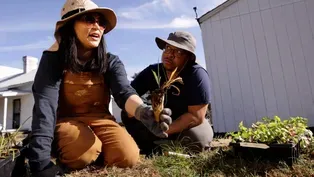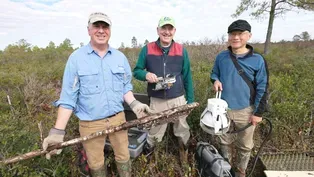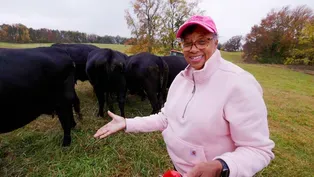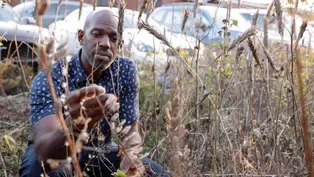
Fighting Saltwater Intrusion in the Blacklands
Clip: Special | 9m 2sVideo has Closed Captions
Productive farmland in NC’s Tidewater region needs protection from rising sea levels.
The Blacklands of NC’s Hyde County are home to some of the most productive farmland in the state. Because of their coastal proximity, farmers experience saltwater intrusion as sea-levels rise and push salt water into drainage ditches. Local farmers like Dawson Pugh are collaborating with researchers and Agriculture Extension Agents to determine how to keep farming, for now and the future.
Problems with Closed Captions? Closed Captioning Feedback
Problems with Closed Captions? Closed Captioning Feedback
State of Change is a local public television program presented by PBS NC
State of Change is part of the Pulitzer Center’s Connected Coastlines reporting initiative. For more information, go to https://pulitzercenter.org/connected-coastlines.

Fighting Saltwater Intrusion in the Blacklands
Clip: Special | 9m 2sVideo has Closed Captions
The Blacklands of NC’s Hyde County are home to some of the most productive farmland in the state. Because of their coastal proximity, farmers experience saltwater intrusion as sea-levels rise and push salt water into drainage ditches. Local farmers like Dawson Pugh are collaborating with researchers and Agriculture Extension Agents to determine how to keep farming, for now and the future.
Problems with Closed Captions? Closed Captioning Feedback
How to Watch State of Change
State of Change is available to stream on pbs.org and the free PBS App, available on iPhone, Apple TV, Android TV, Android smartphones, Amazon Fire TV, Amazon Fire Tablet, Roku, Samsung Smart TV, and Vizio.
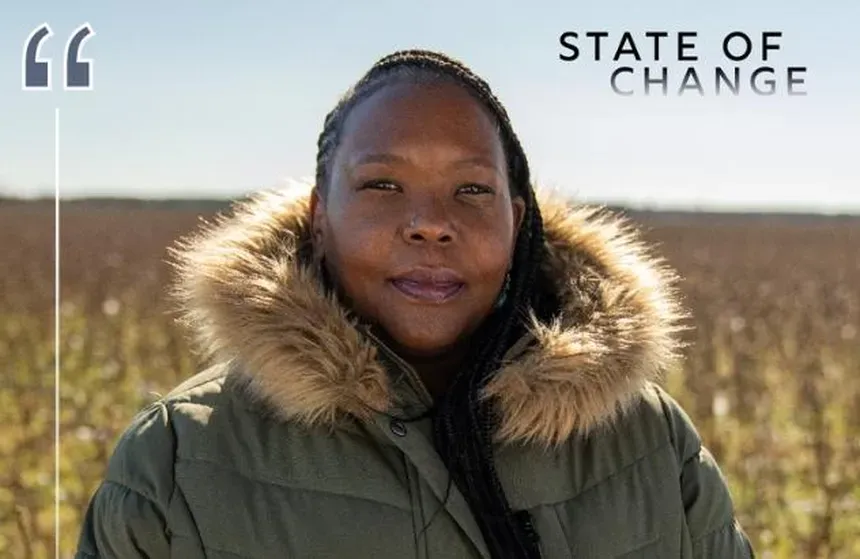
Explore More from State of Change
Hear from North Carolinians about climate change effects & innovative solutions across the state.- Hyde County's a really unique place.
We're located right on the Pamlico Sound on the coast of North Carolina.
Being on the coast, it comes with a lot of challenges.
Drainage is extremely important in Hyde County, it's very flat and very low.
Where we're at right now, it's about three feet above sea level and less in some areas.
There's about 84,000 acres of farmland in Hyde County.
- Drainage ditches are very important to being able to farm our land, to be able to get the water off when we get a rain.
But you know, if you don't have a tide gate or some way to stop the salt water coming back, it'll back up in there.
And then that's where a lot of the salt comes from, from the ditches.
- When the wind's blowing in the wrong direction or you've got storm surge from a hurricane, it doesn't take long and you've got salty water pushing back into the fields.
And then that's when we have issues with saltwater intrusion.
For the most part, when the water is pushed up in these ditches and into the fields it's affecting the edges right along the ditches.
- When salt comes in our fields there's places that will not grow crop and nothing will germinate.
Then there's other areas that the crop will come up and grow but it just will be affected, it won't yield very good.
It's not something that that's just started it's something that's been happening for generations.
But there's new places that we're seeing it come and it's getting worse.
You know, it's something that's we're working on on all the time to try and fend off.
Our farm is located really close to the Pamlico sound.
This water right here in this ditch is salty.
We're only 18 inches above sea level.
The normal tide is what we really try to keep out of our ditches.
We can't control whether a hurricane comes over into the field, but if we can keep the salt water out of there every day, then we can make progress on it.
Saltwater on this side, freshwater on that side.
This gate keeps the saltwater from going in.
When we get rain and the water's higher on the freshwater side, it allows the freshwater to go out.
- This is a salinity meter.
It measures salinity and parts per thousand.
Whenever I check water for a farmer or landowner I want it to be less than two.
Yeah.
Ooh.
- [Dawson] What is it right there?
- [Andrea] Thirteen and a half.
- [Dawson] That ain't good, is it?
- [Andrea] No.
- This thing must be leaking.
- [Andrea] Says it's eighteen six.
- There's why, that gate's cracked open.
This one has a leak, so we just gotta open it up and clean the grass out of it.
- As an Ag Agent for Hyde County, I work with the farmers to determine what the unique needs of Hyde County are.
A big one forming is saltwater intrusion.
And it's an issue, but we're still farming and raising really good crops, producing high yields high above the state average.
On that side of the road they grew potatoes.
Irish potatoes, and they're fresh market potatoes.
So, you know, we're this close, I mean, just on the other side of those trees, from the sound, and they're growing really high value crops.
Whenever you say, well we need to do research, we need to find out what we can do.
But then will say, well, have you seen the maps?
Have you seen the prediction maps for sea level rise?
Like, they just need to leave.
- It would be near impossible to just pick up your farm and move it somewhere.
You've got land that your family has farmed for a hundred years or more.
You just can't go find farmland somewhere else and start farming.
That's pretty impossible.
- Especially being an extension agent, like we're here to provide solutions.
- Look who it is.
- Hi!
My role as an extension agent is basically to connect the farmers with unbiased research based information from NC State and all the other land grant universities.
- The soils in eastern North Carolina, specifically in the Tidewater region, are very high in organic matters.
There's a reason that some of our largest producing farms in the state are out in this area.
These soils are particularly susceptible saltwater intrusion because they have high organic matter, high clays.
And organic matter in clays hold onto salts better than something that's sandy, where it will just wash through the system.
Holding onto salt at the surface is not a good thing in the plant root zones - But this is a really, really bad spot.
- [Dawson] The soil's just packed so tight that water can't go through it.
- And you could pick up like a chunk of the soil and you could see like the layers of the salt.
- Prime agricultural soils have good soil structure.
So this is shapes and these shapes are held together with clays and organic matter.
Can you hand me some of that reference stuff?
- [Julia] Yeah.
- So this is non salt impacted, same soil.
- [Dawson] Oh wow.
- [Matthew] Yeah.
Entering salt into the system leads to loss of that structure.
And when we're losing structure and soils we lose water movement, we get more erosion, loss of carbon.
- An average agricultural field will have about one to one and a half percent carbon.
Whereas out in Hyde County, we see the upwards of like six percent carbon, which is incredibly high and very important to keep in that soil.
- One of the alternative uses for marginal farmlands that have gotten too salty is to put them into conservation reserve programs, which are typically taking them out of agriculture and putting them into more natural conditions.
So that could be planting native trees or returning land to wetlands.
This is just a linear marsh.
I mean, this is like carbon sequestration 101.
Carbon accumulation leads to building land.
By locking carbon in soil you're actually increasing elevation, and by doing that you're fighting sea level rise.
Moment of truth.
Ready?
The way that these systems build up land is that it's super wet.
So we have our water table above the surface here and what that does is the microbes are very slow to break down organic material that's added.
So we're adding a lot of biomass every year from our marsh plants, but the soil microbes are not happy.
They're not able to process that efficiently and send it back to the atmosphere of CO2.
And what ends up happening is you get a buildup of organic material, and this is the amount of organic material that's built up on top of that since this marsh has been here.
There would be a benefit for the farmers in that you're building land up in front of their farm.
It's like a natural berm, and if that can keep up with sea level rise that's protecting your farm behind here from storm surge.
So do you guys get like, soil tests every year from NCDA or every few years?
What we're trying to do is get a way that within 40 minutes someone like Andrea or someone from NCDA could come out using our field kit and they would get a number from the field kit in electrical conductivity and it would basically correlate you to their soluble salts index.
The farmers know their soils, so they do soil testing all the time.
And so relative to what their last soil test was what does the soil test this time tell them?
Was there a significant increase in salt from a hurricane for example?
Currently the methodologies that are available to farmers are time intensive.
It takes upwards of a month to get information about soil tests as far as salinization.
And that in many cases after a hurricane does not allow for management decisions on a quick basis.
So we're trying to develop rapid methodologies that are essentially field kits that can be used by extension agents out in the field to rapidly assess the soil characteristics.
And so in 40 minutes you can get a similar answer to what would take over a month right now through the state labs.
- That's what's exciting.
We had all these projects but now everybody's coming together and is working hard to find a solution for the farmers.
If we could find some salt tolerant varieties, or develop some crops that can be marketed in our profitable that we could grow on the land that you know we're trying to get turned around.
That would really be great.
- We know it's inevitable for sea level rise to continue and climate change to continue.
But Hyde County is extremely important for agricultural production, and it's these people's livelihoods.
So really, we want to support them.
- I think the future is going to be challenging, but I mean I've got a son that's going to college, he wants to come back and farm.
So we're doing everything we can to preserve our land for the future.
Planting Piedmont Grasslands Helps Fight Climate Change
Video has Closed Captions
Learn how planting native grassland plants mimics historical landscapes and stores carbon. (8m 34s)
The Potential of Pocosin Peatlands’ Carbon Storage
Video has Closed Captions
Trek into the coastal peatlands and learn how these unique landscapes store carbon. (8m 25s)
Thinking Outside the Box with No-Till Farming
Video has Closed Captions
Farmers and researchers in Reidsville see the positive impacts of no-till agriculture. (8m 22s)
Video has Closed Captions
North Carolinians are using natural solutions to respond to our changing climate. (59s)
Providing Support for PBS.org
Learn Moreabout PBS online sponsorshipState of Change is a local public television program presented by PBS NC
State of Change is part of the Pulitzer Center’s Connected Coastlines reporting initiative. For more information, go to https://pulitzercenter.org/connected-coastlines.
